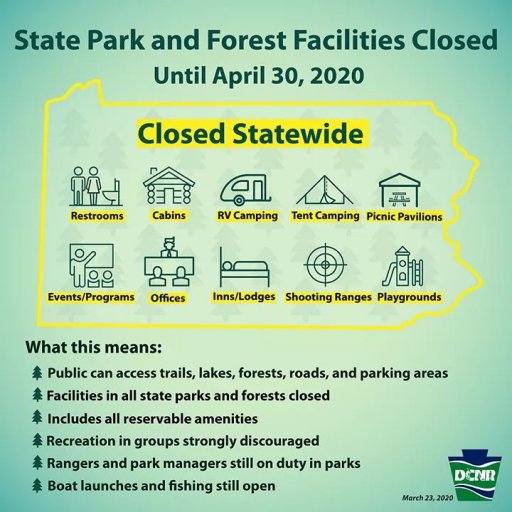
Member III
- 2,497
- First Name
- John
- Last Name
- Carter
- Member #
-
4860
- Ham/GMRS Callsign
- KE0LRZ
- Service Branch
- Navy (vet)
I agree that is public speaking 101. I recently posted in a different thread; what I thought would be a funny, but it bombed badly. ¯\_(ツ)_/¯.
I have all kinds of time to spare for this sort of thing. I'm an incurable infohound at heart.
Other than her lame attempt at humor with "You really really should not listen to any old person about Covid-19“ at the start (I'll bet anything she read somewhere to "Start your public speaking engagement with a joke to warm up the audience"), what she had to say was thought-provoking, I agree.
I owe you a beer or coffee or two for bringing it to my attention.
I'm not sure if you posted her TedTalk to make a point and justify a position, or because you thought I'd appreciate the information.
She pretty much affirms and agrees with, repeatedly, points I've been making in various forums and groups. It's all info I've been absorbing and sharing for weeks.
That we "we can get better at quarantines and travel restrictions and we should." With a new virus like this one, slowing things down and flattening the curve of initial infections by staying put for now and not contributing to the spread will create less of a sudden spike and burden on health systems, allow supply chains to keep up better and build our reserves of critical items, and allow not only our country but others to build better ways to deal with future outbreaks of this, and other, viruses.
That's how we help build a good global health system that will make outbreaks less serious, that Alanna Shaikh considers "our best option." This outbreak is destined to go down as one of the most serious in human history, and it behooves us all to do what we can now to lessen the initial impact so all systems can handle it better. Then the next outbreak of Covid-19 won't be as serious in impact or numbers, just as with influenza strains with appropriate vaccines, because we will know better what to do, will be better equipped in procedure and product, and more societally able to cope.
Right now, in the US, we sucked at being able to act appropriately and in time when this virus was noticed on the horizon. Flattening the curve of infection now by staying put for the time being and not potentially spreading it will help us all be able to better deal with it in future.
Do you know that the same day Kobe Bryant's death in the chopper crash made headlines, Jan 27 (feels like ancient history now), so did the search for a vaccine for this coronavirus? Most of America did not pay much attention to that article, though it was right next to the photo of Bryant. Though not quite eight weeks ago, less than 2,000 people in China and 5 in the US were confirmed sick. It was the first time I became aware of Dr Anthony Fauci, Director of the US's National Institute of Allergy and Infectious Diseases.
He indicated then it would take at least three months--with no bureaucratic or regulatory holdups--to get to phase one of just testing the vaccine, not actually putting it into place. Having an actual usable vaccine has since been estimated at 18 months by him and others. The article also says "even if the vaccine is tested rapidly, it might not come in time to slow the outbreak. Public health effects to limit the spread of the virus and treat those who are infected well have a more immediate benefit."
We can do that--limit the initial spread and impact of the virus-- by not going out adventuring for a while. Believe me, I want to as badly as anyone and have my van and trailer ready to go and be gone for months. I believe the more prudent thing for us all to do is help the health system and supporting infrastructure by staying put for now.
View attachment 145544
As for Allana Shaikh's old person joke at the beginning of her talk, like the Ford quote you added to the Words of Wisdom thread says: "The only real security that a man will have in this world is a reserve of knowledge, experience, and ability." Building a reserve of knowledge, experience, and ability most often comes with age.
Building a reserve of knowledge, experience, and ability in regards to Covid-19 will only come with time, too, and only if we do not overwhelm the system so badly now that it makes it difficult to recover.
Thanks for bringing the TedTalk to my attention. Good info. Hope to meet you out here somewhere someday around a fire for that beer or coffee.
Stay safe, stay clean, stay positive!
.

Roaddude - On the Road In North America - ROADDUDE
Roaddude - Traveling Photographer/Writer/Artist On the Road In North America. Gear, reviews, people, places, and culture.roaddude.com
My main reason for posting the video:
- 1:28 min “If we are ranking sources of health experts on a scale of 1 to 10. 1 is some random person ranting on Facebook (or OB
) and 10 is the World Health Organization!” She claims to about 7 or 8.
- I had hoped you would appreciate this, and I do believe anybody that takes the time to watch will benefit from this information.
She does state that we need a better world health system as does Larry Brilliant:
(Major take away “Early detection early response.” 15:40 min the only way to deal with a pandemic.) and Bill gates:
(he was spot on with his assessment), but this all needed to be done before SHTF!
It’s not just the US that did not prepare, this is an issue all over the world, hopefully, some good will come from it and people will light a fire under their representative's butts to support the recommendations of the speakers in the videos and not what appears to always be knee jerk reactions.
• 5:59 “we can’t stop the outbreaks with quarantine and travel restrictions!” its physically impossible to get that in place fast enough to stop the outbreak.”
I have read that we are looking at 18 months or more for a vaccine, I do not remember who the expert was that said it. It is now being repeated all over.
I am now going to try to make my point now:
https://www.imperial.ac.uk/media/imperial-college/medicine/sph/ide/gida-fellowships/Imperial-College-COVID19-NPI-modelling-16-03-2020.pdf
I pulled these words for word from the various scenario the paper has.
- In the case of COVID-19, it will be at least a 12-18 months before a vaccine is available (References #3). Furthermore, there is no guarantee that initial vaccines will have high efficacy.
- References #3: The Coalition for Epidemic Preparedness Innovations. CEPI welcomes UK Government’s funding and highlights need for $2 billion to develop a vaccine against COVID-19 [Internet]. 2020; Available from: https://cepi.net/news_cepi/2-billion-required-to-develop-a-vaccineagainst-the-covid-19-virus/
- Since the aim of mitigation is to minimise mortality, the interventions need to remain in place for as much of the epidemic period as possible. Introducing such interventions too early risks allowing transmission to return once they are lifted (if insufficient herd immunity has developed); pg 7
- Conditional on that duration, the most effective combination of interventions is predicted to be a combination of case isolation, home quarantine and social distancing of those most at risk (the over 70s). pg 8
- Stopping mass gatherings is predicted to have relatively little impact (results not shown) because the contact-time at such events is relatively small compared to the time spent at home, in schools or workplaces and in other community locations such as bars and restaurants. Pg. 8
- A combination of case isolation, social distancing of the entire population and either household quarantine or school and university closure are required (Figure 3, Table 4). Measures are assumed to be in place for a 5-month duration. Pg. 10
- Not accounting for the potential adverse effect on ICU capacity due to absenteeism, school and university closure is predicted to be more effective in achieving suppression than household quarantine. Pg. 10
- The more successful a strategy is at temporary suppression, the larger the later epidemic is predicted to be in the absence of vaccination, due to lesser build-up of herd immunity. Pg. 11
- A minimum policy for effective suppression is therefore population-wide social distancing combined with home isolation of cases and school and university closure.
- To avoid a rebound in transmission, these policies will need to be maintained until large stocks of vaccine are available to immunise the population – which could be 18 months or more Pg. 14-15
- Long-term suppression may not be a feasible policy option in many countries. Our results show that the alternative relatively short-term (3-month) mitigation policy option might reduce deaths seen in the epidemic by up to half, and peak healthcare demand by two-thirds. The combination of case isolation, household quarantine and social distancing of those at higher risk of severe outcomes (older individuals and those with other underlying health conditions) are the most effective policy combination for epidemic mitigation. Pg. 15
I hope I am wrong.
knowledge, experience, and ability, due come with age and a lot of time studying at the school of hard knocks; if you did not let prejudice and fear corrupt you on your journey. Which I am pondering is her reasoning for her attempt at humor with the old person joke.
If you are still serious about meeting on the trail someday “Iced tea and cornbread took the place of Pills and 90 proof” for me many years ago, Coffee sounds great. If things are better by August do you have any plans to go to the Overland Expo Mountain West?
Last edited:







